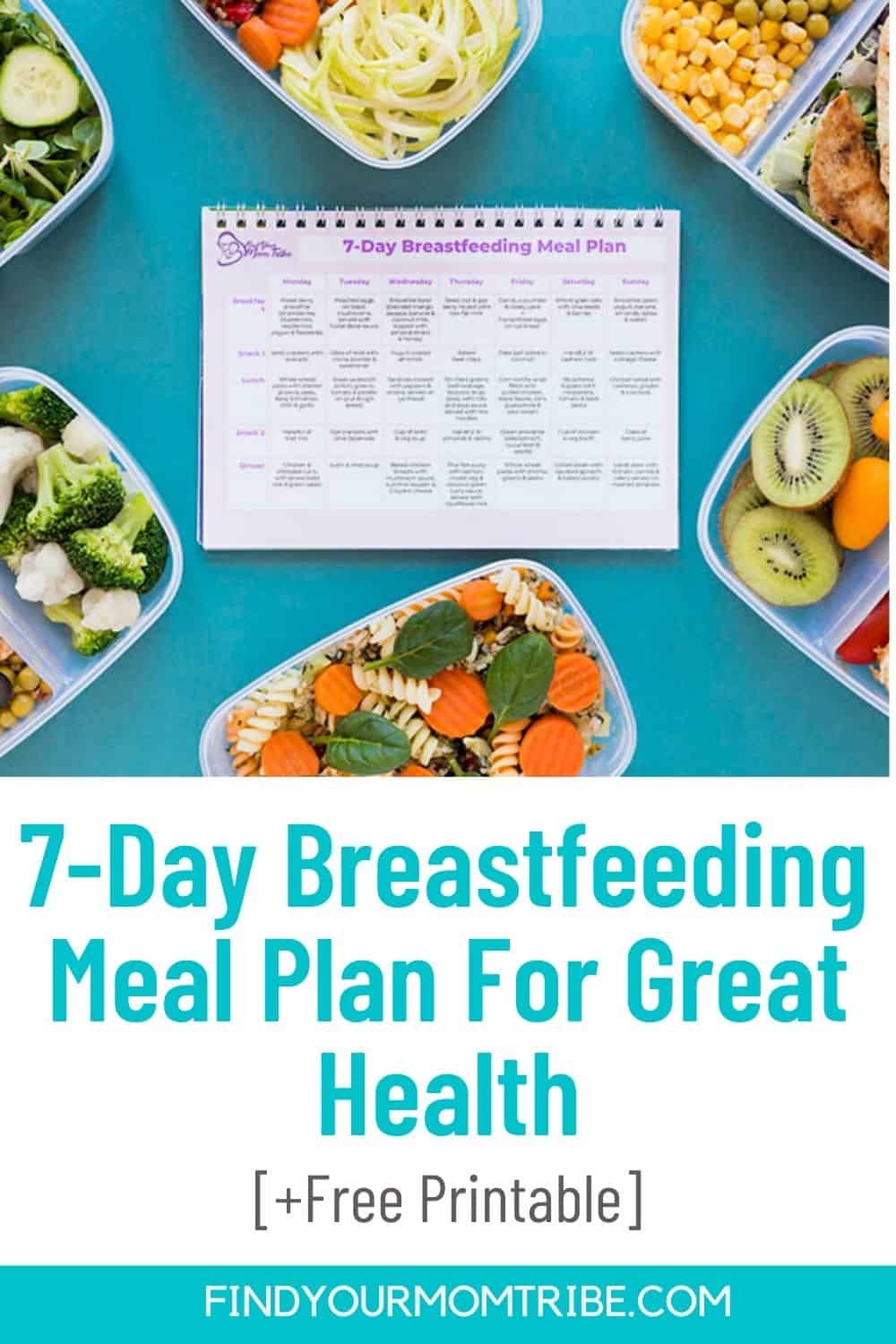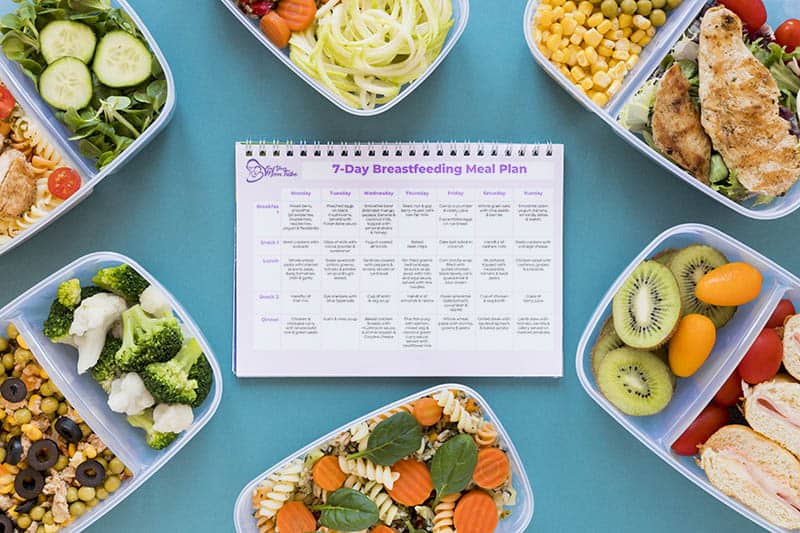What should and shouldn’t I eat when breastfeeding? And how do I put together a breastfeeding meal plan that will help me boost my milk supply, keep my weight down, and give me energy?
I get these questions a lot from our Mom Tribe village mamas, so I’ve decided to put together a go-to nutritional guide, complete with a 7-day breastfeeding meal planner, to ensure new moms get all their nutritional needs met – and little ones get their super-mommy-milk!
Today I’ll be sharing the types of nutrients and foods you’ll really want to include in your diet as a breastfeeding mother, a printable meal-by-meal plan for breastfeeding, and a convenient grocery list, as well as addressing answers to some of the most frequently asked questions.
Without further ado, here’s all the important info you’ve been looking for about eating when breastfeeding.
Nutrients a breastfeeding mom needs and what foods to eat to get them

– meat
– dairy products
– nuts
– grains
– seeds
– vegetables
Iron: Helps to generate red blood cells, in turn helping to maintain your energy levels.
– meat
– liver
– fish
– beans
– leafy veg
– eggs
– whole grains
– nuts
Folic acid (folate): A very important type of B vitamin needed for your baby’s proper health and development. Also aids in preventing congenital disabilities.
– citrus fruits (e.g lemon, lime, orange, grapefruit, mandarin)
– dried beans
– mushrooms
– dark leafy veg
– fortified cereals & whole-grain bread
Vitamin A (beta-carotene): Needed for eye and skin health, and also a well-functioning immune system.
– red/orange/yellow fruit & veg (e.g. sweet potato, carrots, apricot, melon, peppers)
– dark leafy veg
– eggs
– fortified dairy products
– liver
Vitamin C: Really important to ensure healthy bones and teeth, as well as blood vessels and ligaments.
Also enables your body to uptake iron and keep infections at bay. A breastfeeding mother’s vitamin C intake also determines the amount of vitamin C in her breast milk.
– citrus fruits & juices
– tomatoes & tomato juice
– chilli & bell peppers
– strawberries
– blackcurrants
– dark green veg
Zinc: Works in conjunction with protein.
Needed for healthy immune system and metabolism, healing of wounds (think sore nipples!), among many others. If you get too little zinc, it can affect your milk production.
– meat
– dairy products
– potatoes
– nuts
– legumes (e.g. beans, lentils, chickpeas)
– whole-grain products
Calcium: Needed for bone and teeth health. Important to get enough while breastfeeding, as your body takes from its own calcium stores to give to your baby.
– dairy products
– orange juice
– green leafy veg
– soya beans
– tofu
– nuts
Vitamin D: Needed to help absorb calcium and phosphorus, therefore crucial for baby’s growing bones and teeth.
One of the best ways to get vitamin D is via exposure to the sun (that’s why they call it the “sunshine vitamin.”)
– fatty fish (e.g. salmon, herring, sardines, anchovies, pilchards, mackerel, canned tuna)
– egg yolk
– cheese
– beef livers
– vitamin D-fortified foods (e.g. cereals, orange juice, milk, yogurt)
Docosahexaenoic Acid (DHA): An omega-3 fatty acid that is vital during your baby’s early development, especially of the eyes and brain.
– fatty fish
– DHA-enriched eggs
– algae
7-Day Breastfeeding Meal Plan [Printable]
A Breastfeeding Mom’s Grocery List
You can get all the nutrients you need every day by eating a variety of foods from the main groups.
Use this handy list of foods as a guide when shopping (but feel free to add your own preferences too!)
Meat: Chicken, turkey, beef, lamb, pork, fish, seafood.
* Lean-cut meats are the healthier option, as opposed to deep-fried meats, lunch meats, and hot dogs.
Fruits: Bananas, apples, peaches, pears, citrus fruits, berries, cherries, grapes, pineapples, melons, tomatoes.
* Fruit juices, dried fruits, and canned fruits are better in moderation due to their high sugar content.
Vegetables: Broccoli, spinach, kale, lettuce, cabbage, Brussel sprouts, carrots, peppers, beet, avocado, cucumber, celery, squash, zucchini, pumpkin, eggplant, onion, leek, corn, turnip, asparagus, sweet potatoes, microgreens, mushrooms.
* Include a large variety and amount of vegetables in your diet.
Grains & cereals: Brown rice, wild rice, whole-wheat pasta, whole-wheat bread, rye bread, buckwheat, quinoa, barley, tortillas, health muffins, wholegrain crackers, bagels, popcorn.
* Try to replace any “whites” (e.g. rice, bread, pasta) with their whole-wheat variants, as they are far more nutritious.
Dairy products: Milk, yogurt, cheese (incl. pasteurized soft cheeses), sour cream.
* Opt for fat-free/low-fat products that are vitamins A and D-fortified instead of full-fat / double cream / whole milk products.
Pulses, nuts & seeds: Peanuts, peanut butter, nut butter, almonds, chia seeds, pumpkin seeds, sunflower seeds, flaxseed, peas, beans, soybeans, lentils, chickpeas, hummus, sprouts.
* Pulses and seeds are great for the digestive system due to their fiber content, while nuts are quality sources of protein.
Healthy fats & oils: Olive, canola, flaxseed, avocado, peanut, coconut, and sesame oils.
* Limit the use of butter, cheese, and spices that are high in saturated fat.
Liquids: Water, other non-caffeinated beverages.
Breastfeeding Diet FAQs

• Why is it important to eat healthy foods while nursing?
• Is a breastfeeding diet different from a pregnancy diet?
• How does my nutrition affect my baby and breast milk?
• What foods should I eat, avoid eating, or eat less of when breastfeeding?
• How much water should I drink while nursing?
• Can I cut carbs while breastfeeding if I want to lose weight?
What is a healthy breastfeeding diet?
The goal of a breastfeeding meal plan is to include a wide variety of foods to make it well-balanced.
A healthy breastfeeding diet consists of adequate amounts of all the above-mentioned nutrients – vitamins, minerals, protein, dairy, whole grains, and fats.
To produce breast milk, nursing moms require extra calories, as breastfeeding burns around 500 calories a day.
As a nursing mom, you should eat a little more than a woman who is not breastfeeding (1500-1800 calories daily is good).
This is totally achievable by eating three meals a day with snacks in between.
Be sure to consume a wide variety of foods every day (it’s more interesting like this, anyway!) and whatever you do, do not skip meals.
Many registered dietitians and lactation consultants advise that instead of counting calories, to be guided by your appetite and focus on nutritious foods, staying away from high-fat, sugary, or salty ones, like chips.
If you’re not sure that you’re not following a healthy diet, or if you need any advice regarding your eating habits in general, chat to your doctor or a nutritionist.
Why is it important to eat healthy foods while nursing?
Your body takes everything needed to make quality breast milk from the nutrients stored in your bones, tissues, and fat.
This way, your little one will be sure to get all the nutrition his tiny body needs to grow healthy and strong.
If you don’t follow a balanced diet that contains the type of foods that replace those nutrients in some way, your body will still make enough quality milk for your baby, but your own health will start to suffer.
Soon enough, the lack of nutrients will take a toll on your body, and you will eventually become drained and exhausted (and if your energy levels are too low, it can undermine your milk production).
Keeping a healthy, balanced diet while breastfeeding will help you supplement your nutritional needs, recover faster after the birth of your baby, keep up your milk production, have more energy, and just feel better overall.
Is a breastfeeding diet different from a pregnancy diet?
Many women start changing their diets when they’re pregnant. You might start with a prenatal vitamin, eat more wholesome foods, add healthy snacks between meals, and cut down on the amount of coffee you drink each day.
If you’ve done all these things, you probably won’t need much adjustment to your diet as you transition from pregnancy to breastfeeding.
How does my nutrition affect my baby and breast milk?
Many of the foods you eat carry over in your breast milk and affect the composition, taste, and color of your milk.
One fun fact about breastfed babies is that they get used to their mom’s favorite food and they continue eating the same food when they get older.
(This explains, for example, why spicy Indian cuisine never creates issues with breastfed babies in that culture.)
What foods should I eat, avoid eating, or eat less of when breastfeeding?
Well, as a breastfeeding mom myself, let me reassure you from the get-go that you can pretty much eat just about anything you want.
You heard me right. Generally speaking, there’s no reason to avoid any specific types of foods while nursing your baby.
Moms all across the globe breastfeed – some with pretty strong spices and fragrant vegetables.
It may come as a surprise to hear that even women who don’t have a healthy diet can maintain a healthy supply of high-quality breast milk.
Deciding to breastfeed doesn’t mean having to give up all your favorite things.
That said, although you don’t have to deprive yourself of food, there are certain foods that you must limit.
It’s okay to enjoy a cup of coffee, but you should limit the amount of caffeinated beverages to one or two cups a day.
You can definitely have chocolate or any other empty calorie snacks at one time or another. You can even have the occasional alcoholic beverage.
The big thing you need to remember here is to not overdo it.
There really isn’t any food you should totally avoid, but some babies may have a food sensitivity or allergy to a certain ingredient in your diet.
If you or someone in your family had food allergies make sure to avoid that food if you’re breastfeeding.
In these cases, it may be wise to speak to a nutritionist who may suggest an elimination diet.
How much water should I drink while nursing?
Too little fluids can also affect your milk volume, so you should be sure to consume at least 8 to 12 glasses of fluids daily (coffee, tea, or other caffeinated drinks don’t count).
The ideal is to drink something every time you breastfeed your little one. And let your thirst guide you, as well as your urine color – it should be a light, pale yellow.
If it’s dark or cloudy, you’re dehydrated and need more water.
Can I cut carbs while breastfeeding if I want to lose weight?
Carbohydrates (particularly those with a low GI) play an important part in a breastfeeding mom meal plan.
Roughly half of your energy typically comes from carbs, so being sure to include it in your diet will keep your energy levels high.
When it comes to your breast milk, lactose is the most vital carbohydrate.
Lactose helps to reduce harmful bacteria in your baby’s stomach, which in turn helps with the absorption of calcium, magnesium, and phosphorus.
It also assists in your baby’s ability to fight disease and maintain a healthy gut.
So forget about fad diets and rapid weight loss of those famous moms – a sudden reduction in calories can have negative effects.
“Less than 6 ounces (175 g) of carbohydrate per day can also affect your milk supply,” says registered dietitian and lactation consultant Catherine Day.
If you’re really worried you won’t be able to shed your pregnancy weight or will even gain more weight while breastfeeding, don’t make any drastic cuts in your diet.
Rather ask a registered dietitian for a personalized eating plan that caters to your specific energy needs and also includes exercise.
Aim to get your pre-pregnancy body back over the span of a year by losing at most 1 pound per week and making sensible food choices.
In Closing

A quick reminder to take advantage of our free printable breastfeeding meal plan.
Stick it on your fridge to save you the hassle of trying to decide what to eat – it’ll also make meal planning and prep that much easier knowing ahead of time what’s on the menu.
One final tip before I wrap up: Save yourself the effort and time (goodness knows you’re not going to have much of it with a little one to look after) and cook or prepare as many meals as you can ahead of time in one go, then just pop it all in the fridge or freezer until you need it.
This has been a true lifesaver for me.
Alright, mammas, I’m off to the grocery store to pick up some fresh fruits and veggies.
All this talk of food has got my mouth watering!
Until next time!
Like this post? Please share or pin it for later. You can also stay in the loop and follow us on Facebook, Instagram or Pinterest.

This post contains affiliate links. Please see our full disclosure for more info.

![7-Day Breastfeeding Meal Plan For Great Health [+Free Printable]](https://cdn.findyourmomtribe.com/wp-content/uploads/2020/06/breastfeeding-meal-plan-on-phone.jpg)
